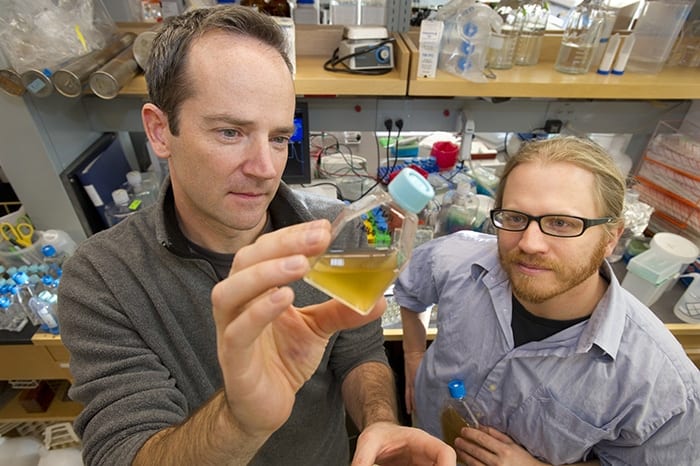WHOI Research Projects Awarded $5.2 M to Support Marine Microbial Research
December 27, 2012
There are more microbes in a bucket of seawater than there are people on Earth. Despite their abundance, humans are only just beginning to fathom the complex role marine microbes play in the ocean ecosystem.
These tiny creatures are responsible for the chemical reactions that drive Earth’s marine biogeochemical cycles, yet, in terms of how and why groups of microbes interact and what the functional consequences are of those interactions, they are still considered “black boxes.” An understanding of them is critical for assessing the ocean’s health and productivity.
Three projects at the Woods Hole Oceanographic Institution, which received a total of $5.2 million in 2012 from the Gordon and Betty Moore Foundation’s Marine Microbiology Initiative, will employ scientific inquiry and the latest technology and laboratory techniques to shed light on microbes. Their work will look for answers to questions regarding the flow of nutrients through microbial food webs—who eats and secretes what, where, and when—and the resulting biogeochemical transformations.
“The support of the Gordon and Betty Moore Foundation is critical to enabling a fundamental understanding of microbes’ contribution to ocean health and productivity,” says WHOI President and Director Susan Avery. “There is so much more to know about marine microbes’ genetic diversity, how they secure nutrients, what other organisms they interact with, and the biogeochemical changes they bring about in the ocean. These new projects will contribute toward the ultimate goal of a comprehensive understanding of marine microbial communities.”
For the last few decades, oceanographers have been thinking about microbes simply as components of the marine food web: they take up nutrients and are prey for larger organisms, and their abundance and diversity in the ocean depends only on the amounts and types of nutrients and predators in their environment. This view is overly simplistic, and these grants will allow WHOI investigators to look at the molecular basis for the much more complex processes that they have hypothesized are at play in the sea.
These awards target advancing understanding at inter-disciplinary interfaces in microbial oceanography by supporting the development of sophisticated technologies and methods and by testing the newly developed approaches in the field. The funded projects at WHOI include:
- Investigating Dissolved Organic Matter in the Microbial Loop – WHOI chemist Dan Repeta with Ed DeLong at MIT
To develop laboratory and field-based experimental systems for characterizing the roles of microbial physiology, ecology and biogeochemistry in the cycling of dissolved organic matter in the nutrient-poor ocean. - Identification and Quantification of New Biomarkers for Key Microbial Species – WHOI chemist Elizabeth Kujawinski
To develop new protocols to detect the products of microbial metabolism in seawater to understand the influence of marine microbial communities and their activities on the chemical composition of their surroundings. The new procedures will enable researchers to quantify the abundance of these molecules that serve as the currency of nutrient flow among the studied microbes. - Infochemical Control of Microbial Carbon and Nutrient Cycling in the North Atlantic – WHOI chemists Ben Van Mooy and Tracy Mincer, and WHOI biologist Matt Johnson, with Kay Bidle at Rutgers and Assaf Vardi at the Weizmann Institute of Science in Israel
To investigate how certain molecules – or “infochemicals” – that microbes use to communicate with one another influence microbial interactions and nutrient cycling in the North Atlantic Ocean. The project has the potential to create a new view of the sea where infochemical signaling governs the inter- and intra-domain microbial interactions that influence the biogeochemical fluxes of carbon and nutrients.
“The introduction of improved instrumentation for geochemical analysis and powerful new molecular biology techniques for studying genomes and gene and protein expression has given us new ways of looking at how microbes function in the marine environment,” says Ajit Subramaniam, program director for the Marine Microbiology Initiative. “With Moore Foundation support, we want to enable multidisciplinary teams of scientists to identify and quantify nutrient pools in the ocean, and decipher the genetic and biochemical bases of microbial metabolism.”
About the Woods Hole Oceanographic Institution
The Woods Hole Oceanographic Institution is a private, non-profit organization on Cape Cod, Mass., dedicated to marine research, engineering, and higher education. Established in 1930 on a recommendation from the National Academy of Sciences, its primary mission is to understand the ocean and its interaction with the Earth as a whole, and to communicate a basic understanding of the ocean’s role in the changing global environment.
About the Gordon and Betty Moore Foundation
The Gordon and Betty Moore Foundation, established in 2000, seeks to advance scientific research, environmental conservation and patient care. The Science Program’s Marine Microbiology Initiative strives to deepen our understanding of marine microbial communities. As the smallest and most abundant organisms in the Earth’s oceans, marine microorganisms play a critical role in maintaining ocean health and productivity. For more information, please visit www.moore.org.

